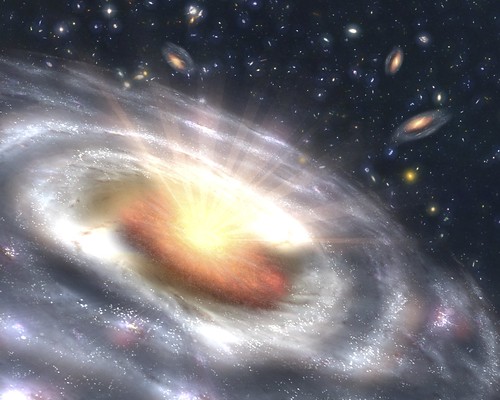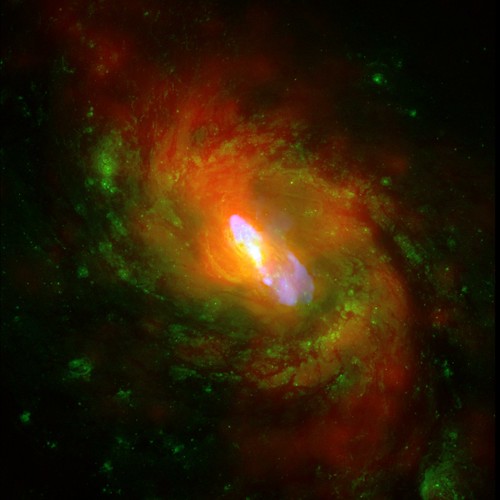Blueshift ponders… black holes – fact or fiction?
- By Sara Mitchell
- December 17, 2010
- 3 Comments
If November can have Black Friday, we thought… what if December had Black Hole Friday?
People have a lot of really interesting ideas about black holes. We can’t always blame them – black holes are quite mysterious and exciting objects, and scientists are curious to figure out all of their secrets! Plus, pop culture has offered a variety of takes (some more fantastical than others) on black holes – check out this list of black holes in TV and movies (which hasn’t been updated in several years, but it’s still an interesting read). So when we do outreach, we end up dealing with a lot of misconceptions, the ideas that people have that are weird, wacky, or just not quite right.

Credit: NASA/JPL-Caltech/T. Pyle (SSC)
We regular battle a variety of misconceptions about black holes – that they’re some sort of monstrous space vacuum cleaners that roam the universe and eat everything they find. But alas, physics says that just isn’t possible. Sometimes we feel like we’ve entered an episode of Mythbusters, trying to debunk the ideas that come our way about black holes! So we wanted to ask our scientific colleagues here in NASA Goddard’s Astrophysics Science Division about their least favorite black hole misconceptions… and then we’ll give you a few links with the real scoop on black holes!
Blueshift ponders: What misconceptions about black holes drive you crazy? What are some of the wackiest things you’ve heard about them?
Kevin says: They pull in everything nearby, like some kind of magic. I get at least two of those every time I’m on [the Ask an Astrophysicist] hotseat.
Or maybe, how do we know they’re black because of gravity and whatnot. As if we see these black things and are trying to explain what they are.
Maggie says: One big myth is that if the Sun were replaced by a black hole, that the Earth would be sucked into it. That would never happen! We might have other problems, of course…
Jane says: It drives me crazy when people think black holes are just a myth. There’s definitely a black hole at the center of our own galaxy — astronomers see stars zipping around it, and by measuring those stars, we’ve learned that the black hole has a mass several million times the mass of our sun.
Koji says: There are people who see a rubber sheet bent by the weight type illustration and think black holes are (maybe) 2-dimensional. Also, some people think black holes, rather than the accretion flows around them, emit jets.
Jean says: That they take you to another universe!
Neal says: The [insert particle accelerator here] will make a micro black hole that will eat the Earth.
Barb says: One black hole misconception that drives me nuts is that they suck up everything around them. Truth is that they have no more gravitational pull than any other object with their same mass – if the Sun wouldn’t suck up the Earth, then a Sun-massed black hole in the center of our solar system wouldn’t, either.
I’m so tired of explaining that black holes are not portals to another place or time. People hear that the math allows for this possibility, and it does; however, math has to be connected to the real, physical Universe. It turns out that the conditions that would need to exist to make that connection occur have probably never happened. The reality is that once you or your spaceship falls into a black hole, you get squished and add the mass to the black hole.
Mike says: That they are wormholes to another universe or another part of the universe. The DS9 effect, I like to call it.

Image Credit: X-ray (NASA/CXC/ MIT/C.Canizares, D.Evans et al), Optical (NASA/STScI), Radio (NSF/ NRAO/VLA)
You can tell that wormholes and time travel are an especially touchy subject around here! So if that’s the fiction… what’s the fact? We couldn’t just leave you there! Here are a few places to learn more about black holes:
- Imagine the Universe! has a nice introduction to black holes and how we know they’re there (plus a little on all that “wormhole stuff”).
- Here’s an animated introduction to black holes from Hubble.
- Check out Blueshift’s black holes tag to see all of our coverage of the subject.
And if you’ve got an hour to spare, here’s Bad Astronomy’s Phil Plait on “Seven Ways a Black Hole Can Kill You”:
Now we want to know – what’s the wildest thing you’ve heard about black holes? Want to find out if it’s true? Leave a comment!
Comments are moderated and we ask that you be respectful. No profanity please! Any comments with non-NASA links may be edited or removed.
Disclaimer: All opinions in this blog entry are that of specific individuals and do not represent those of NASA, Goddard Space Flight Center, or Blueshift.



in my own opinion i think that black holes exist and that all those objects that goes around that hole will banished.its only a matter of seconds and everything will be gone.like a lightning rays of lights and i believe that there will be a sign when our God almighty make use of that black hole power.
black holes are called balck holes becaz no light cant come from it,so we cant c it,what is really going on there,is that a big deep hole with infinitive mass,what is waiting at the end of this hole,
i read an article about black hole, that… black hole is a death star,some dead star before it death it losses it’s area and become a little object,but have its own mass,so a little object with infinitive gravity became a black hole,it ill ve a lots of energy and so its own light can break this energy and can’t come to us… i don’t know is that true or not,but it means that black hole is not black within it,if we can enter this black hole we ill c light,may be haven light….beautiful light..
Black holes are the result of believing that bodies move by gravitational geodesic. The first and second array element of the Schwarzschild metric are the mathematical inverse of each other. But if they were equal, then, even indep …endently of the possible zeros and infinite, light cones never be closed. There would be no event horizons or black holes. ‘Teoría Conectada’, the only alternative to Einstein’s general relativity, is the solution to the problems of theoretical physics today.